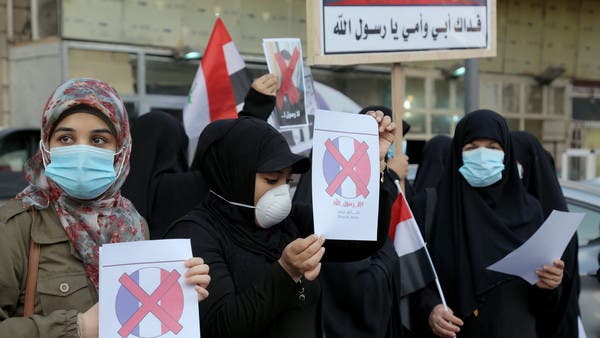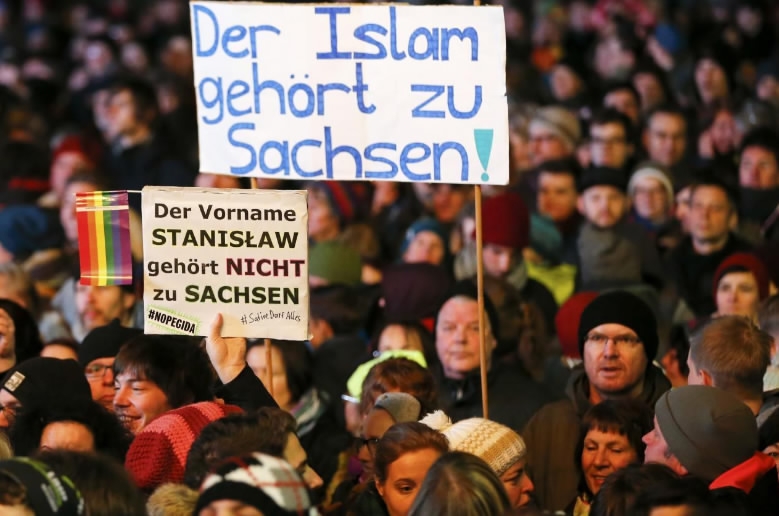
Iraqi people gather during a protest against the publications of a cartoon of Prophet Mohammad in France and French President Emmanuel Macron's comments, outside the French embassy in Baghdad, Iraq, October 26, 2020. /Reuters
Iraqi people gather during a protest against the publications of a cartoon of Prophet Mohammad in France and French President Emmanuel Macron's comments, outside the French embassy in Baghdad, Iraq, October 26, 2020. /Reuters
Editor's note: Jawad Khalid works for an international aid agency in Pakistan. The article reflects the author's opinions and not necessarily the views of CGTN.
From Canada to Hungary, the world is witnessing a rise in Islamophobia. In the capitals of Europe, right-wing politicians incite their anti-immigrant hatred by harping on an ill-founded fear of a Muslim invasion of Europe.
Data from surveys confirm the worrying trend of Islamophobia in the West. According to a UN report, in surveys conducted between 2018 and 2019, an average of 37 percent of Europeans held negative views of Muslims. In 2019, 62 percent of Muslims within the U.S. and 68 percent of Muslim women experienced some form of religious discrimination according to a survey by the Institute for Social Policy and Understanding.
Last month, a Muslim family of Pakistani origin were mowed down by 20 year-old Nathaniel Veltman in Canada, a country which prides itself on its multiculturalist ethos and diversity. In 2017, four Muslim men were shot down in a mosque in Quebec. As a result, anti-Muslim hate crimes increased by 151 percent in 2017. In New Zealand, another peaceful country, the most violent Islamophobic terror attack took place in 2019 when Christchurch mosques shooting killed 49 Muslim worshippers. The fact that the worst episodes of Islamophobic violence in the world took place in what are apparently immigration-friendly countries is alarming.
What are the reasons of this global wave of hate crimes and terror attacks against Muslims? How did Islamophobia reach such epidemic proportions? The problem of Islamophobia needs to be analyzed from three vantage points. One is the historical context with its roots in Orientalist theory which perceives Muslims as the other. Edward Said's magnum opus Orientalism explored the negative stereotyping of Arab and Muslim starting from the Crusades to the colonization of Muslim lands. The post-Cold War manifestation of this ideology was in Samuel Huntington's Clash of Civilization. Huntington asserted that in the post-Cold War world, cultural and religious identities will be the primary source of conflict and Islam and West would constitute a major share of this clash of civilizations.
At the beginning of the 21st century, the 9/11 terrorist attacks on World Trade Center in New York and Pentagon led to a huge surge in anti-Muslim hatred globally. The clash of civilization thesis was finally cemented and the boundaries between us and them were clearly drawn. Islamophobia seeped in the body politic of Western states in the pursuit of War on Terror. Othering of the Muslim took form in discrimination, surveillance, ethnic profiling, and legislation both in the United States and Europe.

People hold a banner which reads "The Islam is part of Saxony" at the rally "Open-minded and colorful Dresden for everybody!" to protest against PEGIDA in front of the Frauenkirche (Church of Our Lady) in Dresden January 26, 2015. /Reuters
People hold a banner which reads "The Islam is part of Saxony" at the rally "Open-minded and colorful Dresden for everybody!" to protest against PEGIDA in front of the Frauenkirche (Church of Our Lady) in Dresden January 26, 2015. /Reuters
In the past decade, rising Islamophobia in Europe has been embedded in larger context of immigration and the rise of far right political parties. Today immigration is a deeply divisive issue highly politicized by the nationalist far right parties who openly incite xenophobia and fear of the immigrants; their vitriol mostly reserved for Muslims escaping their war-torn lands to get to the European borders.
Some political parties in Western countries have similar views on immigrants, Muslims and Islam. The right-wing intelligentsia and political elite fuel the xenophobic, anti-Muslim rhetoric to exploit discontent and gain social and political clout.
They find a population easily susceptible to irrational fears and ill-founded conspiracy theories like the Great Replacement and Eurabia by anti-immigration intellectuals like Renaud Camus. Brenton Tarrant, the Australian who massacred 49 Muslim worshipers at two mosques in Christchurch in 2019 was greatly influenced by Camus. Tarrant named his manifesto after Camus' treatise The Great Replacement in which he voiced similar concerns of white populations in the West being invaded and replaced by Muslims.
What makes people prone to radical ideologies making them blind to rationality? One of the reasons is the growing global discontent spurred by economic precarity. In the wake of 2008 financial crisis, increasing neoliberal reforms like austerity measures have led to a decline of living standards and shrinking of the middle classes globally. Decreases in wages, rising unemployment, inflation and broader inequalities in income have created a strong sense of powerlessness and disenfranchisement in urban lower and middle classes thus alienating them from mainstream political parties and political and economic systems. The far right has skillfully exploited this frustration channeling it into political clout.
Scholarship has also confirmed the link between income inequality and right wing support. In their study, "The Threat of Social Decline: Income Inequality and Radical Right Support," Sarah Engler & David Weisstanner analyzed data from 14 OECD countries spanning over three decades. They found that rising income inequality leads to radical right support. When people perceive a threat to their social status, they shift to the radical right to defend existing structures.
Fear of being replaced or erased might be irrational but the actual fear beneath this irrationality is much deeper. This is the fear of loss of status and identity and the attempt to assert and hold on to it. This also explains the rise of nationalism and tribalism in opposition to globalization and multiculturalism. Hence, tribalism and nativist ideologies are extremely attractive since they allow a sense of belonging and solidarity in a world characterized with instability and precarity. By offering simplistic and populist remedies like building walls or closing borders, the right-wing parties offer a much needed consolation to those who see a threat to their social status, both perceived and real.
Muslims provide the perfect scapegoat for the far right to project the insecurities and anxieties of the population. Like the Jews, Communists, Irish and Black people in the past, the Muslims today are blamed for many problems in the society. This helps in offering simplistic explanations of complex issues to evade responsibility and avoid confronting the root causes.
The rising Islamophobia in Europe and the West is an ominous warning of the troubling times ahead. Europe must pay heed to the signs and learn from its bloodstained past. In the two world wars fought in the last century, xenophobia and fascism rose from the fringes of society to unleash havoc in the world.
At the same time, the world needs to wake up to the fact that neoliberal economic policies have failed to deliver egalitarian economic growth and instead have only created inequality and deprivation. Brexit and the rise of authoritarian governments of Trump and Modi are a proof that that people are looking for salvation in right wing populists and demagogues. Thus, egalitarian social democratic systems with a bolstered welfare state may offer a long term remedy against the radical far right.
(If you want to contribute and have specific expertise, please contact us at opinions@cgtn.com.)

